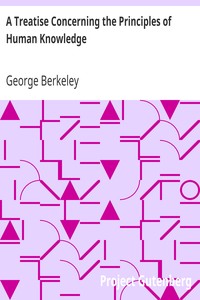A Treatise Concerning the Principles of Human Knowledge by George Berkeley
"A Treatise Concerning the Principles of Human Knowledge" by George Berkeley is a philosophical treatise written in the early 18th century. The work explores the foundations of human knowledge, particularly questioning the nature of existence and the perceivable reality, focusing on ideas and their connection to the perceiving mind. The opening of the treatise sets the stage for Berkeley's inquiry into the principles of human knowledge, highlighting the contradictions and difficulties that
arise from traditional philosophical thought. Berkeley challenges the notion that material objects exist independently of perception and argues that what we consider real is intrinsically tied to our experiences and ideas. He enunciates his aim to investigate and clarify the sources of skepticism and misunderstandings in philosophy, suggesting that many errors stem from the flawed assumption of abstract ideas divorced from direct sensory experience. The introduction serves as a foundation for Berkeley's key thesis: the existence of things is inherently linked to being perceived, a concept he seeks to thoroughly investigate throughout the text. (This is an automatically generated summary.)
Read or download for free
| How to read | Url | Size | |||
|---|---|---|---|---|---|
| Read now! | https://www.gutenberg.org/ebooks/4723.html.images | 244 kB | |||
| EPUB3 (E-readers incl. Send-to-Kindle) | https://www.gutenberg.org/ebooks/4723.epub3.images | 174 kB | |||
| EPUB (older E-readers) | https://www.gutenberg.org/ebooks/4723.epub.images | 177 kB | |||
| EPUB (no images, older E-readers) | https://www.gutenberg.org/ebooks/4723.epub.noimages | 145 kB | |||
| Kindle | https://www.gutenberg.org/ebooks/4723.kf8.images | 385 kB | |||
| older Kindles | https://www.gutenberg.org/ebooks/4723.kindle.images | 377 kB | |||
| Plain Text UTF-8 | https://www.gutenberg.org/ebooks/4723.txt.utf-8 | 231 kB | |||
| Download HTML (zip) | https://www.gutenberg.org/cache/epub/4723/pg4723-h.zip | 174 kB | |||
| There may be more files related to this item. | |||||
Similar Books
About this eBook
| Author | Berkeley, George, 1685-1753 |
|---|---|
| Title | A Treatise Concerning the Principles of Human Knowledge |
| Note | Reading ease score: 53.2 (10th to 12th grade). Somewhat difficult to read. |
| Note | Wikipedia page about this book: https://en.wikipedia.org/wiki/A_Treatise_Concerning_the_Principles_of_Human_Knowledge |
| Credits | Produced by Col Choat. HTML version by Al Haines. |
| Language | English |
| LoC Class | B: Philosophy, Psychology, Religion |
| Subject | Soul |
| Subject | Knowledge, Theory of |
| Subject | Idealism |
| Category | Text |
| EBook-No. | 4723 |
| Release Date | Dec 1, 2003 |
| Most Recently Updated | Dec 28, 2020 |
| Copyright Status | Public domain in the USA. |
| Downloads | 786 downloads in the last 30 days. |
| Project Gutenberg eBooks are always free! | |


